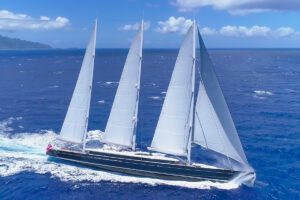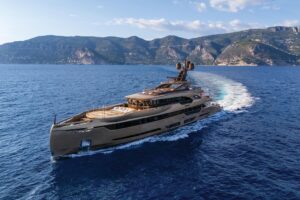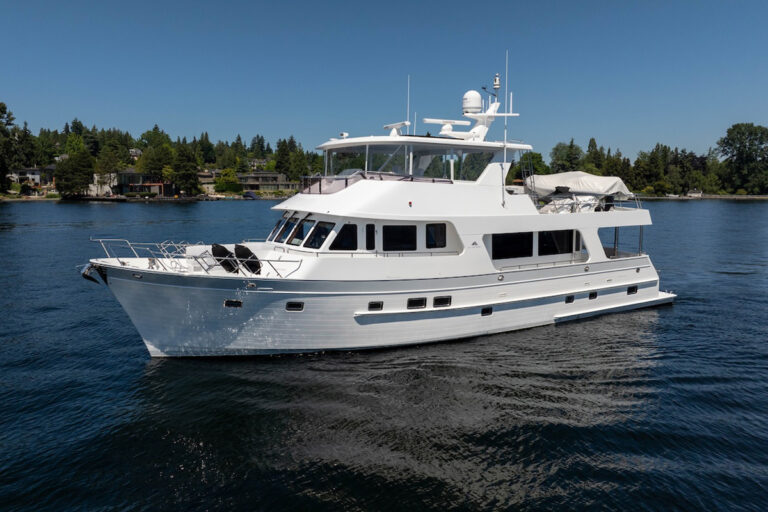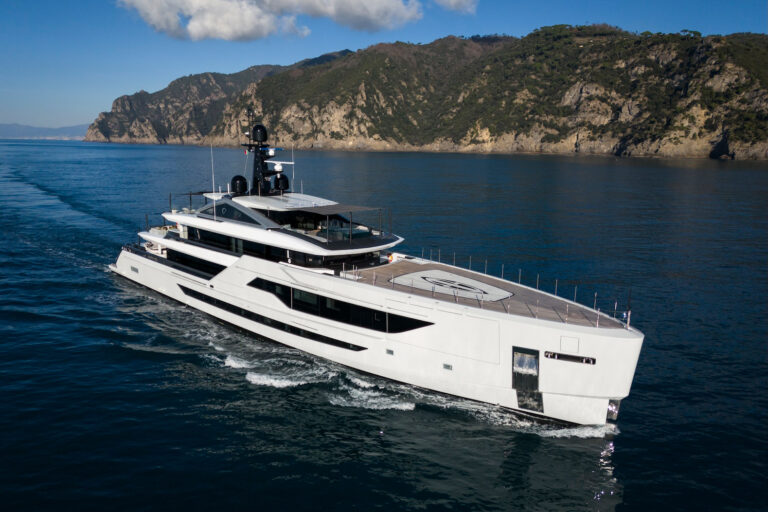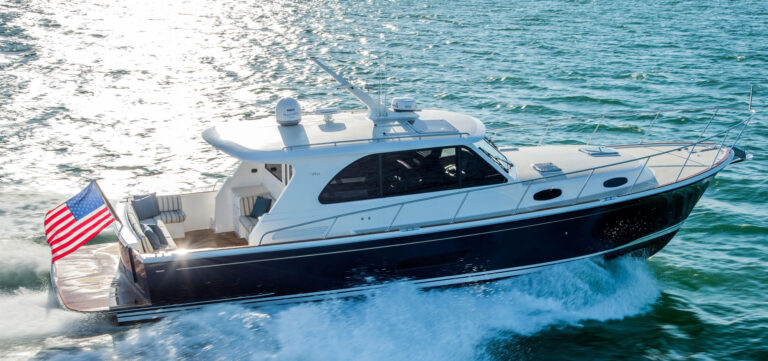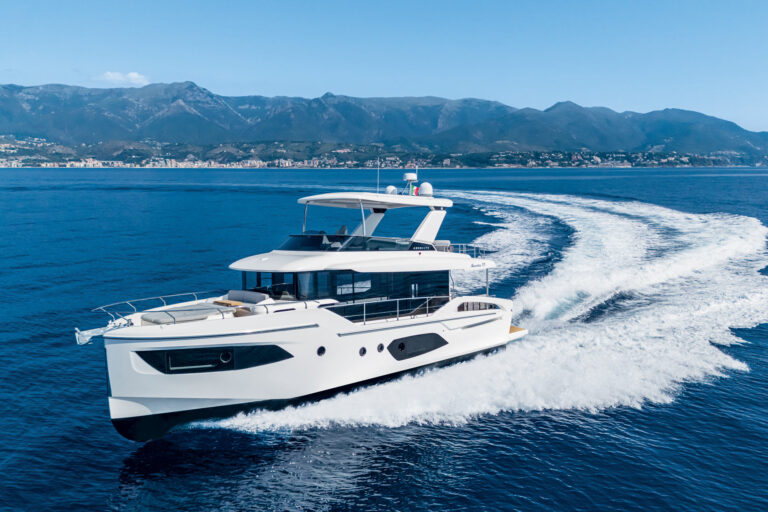About eight years ago, I ditched my job as a book editor, sold my house, bought a 40-foot, 30-ton steel trawler I had no idea how to run and went to seamanship school for nine weeks to figure it out. Then I brought my boat on her inaugural journey from Florida to Maine through the Atlantic, and published a book (The Cure for Anything is Salt Water) about it. And that might have been the end of my adventure, because I certainly didn’t have a plan for what would come next. Instead, what might have been just a glorious midlife crisis turned into a whole new career — I’ve been editing, writing and traveling for Yachting for four years now!
In the course of these travels, I’ve met a surprising number of people who were also compelled to walk away from “satisfactory” lives for something less safe, but more thrilling — making their love of the sea a part of their livelihoods.
This kind of radical departure isn’t for everyone, of course. But as journalist Sydney J. Harris put it, “Regret for the things we did can be tempered by time; it is regret for the things we did not do that is inconsolable.”
Drew Read, Marjorie McAllister:
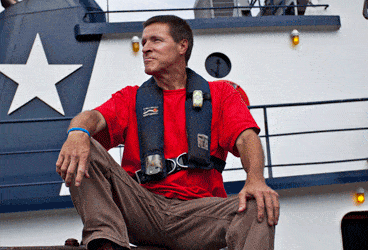
Drew Read had grown up on the water and always wanted to work on it. But he became a sales rep for a paper merchant for 19 years, before trying his hand at several other sales-related business ventures. Still feeling that pull to the water, when his last job with a garage organizational company became less than thrilling, he called longtime friend Pat Kinnier at McAllister Towing in New York.
“What’s the chance of me working on tugs and becoming a tug captain?” he asked. Pat’s response was, “Sure, come up and take a ride for the day and tell me what you think.” Drew had just turned 50 and asked “Am I too old to be a tugboat captain?” Pat said, “Hell, no.” Drew gave his 2 weeks notice a few days later and never looked back.
“I was at McAllister for about a year when they pioneered a school called Tugboat University. I qualified and they paid for my mates’ schooling which took me 27 months to complete at the United States Merchant Marine Academy at Kings Point.” Five years later, Drew has a 1,600-ton near coastal mates’ license and is training on the Majorie McAllister to dock ships and push fuel barges in New York Harbor.
“During my schooling I was working on tugs, going to school, boating on the Chesapeake Bay with my wife, Lori, and trying to have a home life.” Drew notes that it wasn’t always easy but, “When the dream is big enough, the facts don’t count.”
Laura Parish, Pelagic Australis:
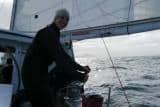
This Brit’s odyssey began 10 years ago when, as an amateur sailor, she was lucky enough to be part of the winning crew on the BT Global Challenge round the world yacht race. It was the Southern Ocean experience that really stuck with her through the years of land-based life afterwards, Parish admits.
Her partner, Miles, was working as a skipper on ocean yacht charters and spending months away from home. “[He was having] fulfilling adventures and seeing the world and none of it bothered me as I trudged each day to the comprehensive school in which I was a math teacher.” Teaching in itself gave Parish enough of a challenge, and she was never very tempted by the Caribbean waters where Miles spent much of his time as a skipper.
In 2008 however, Miles was given a chance to sail the Beagle Channel and then to take some young adventurers across the Southern Ocean to find the magnetic South Pole. “At this point I really became quite insanely jealous. I put more and more into teaching in order to forget how Miles was now midway between the Straits of Magellan and the Falkland Islands, but there was a pull so strong it was impossible to ignore.” Parish jumped into researching possible positions on yachts in southern waters, which lead her to famed ocean racer Skip Novak.
“I had heard of Skip Novak and Pelagic Expeditions, and reading his website left me tingling with excitement. I decided that Miles and I had exactly what was needed to run one of his boats and I e-mailed Skip. My boyfriend and I want to come and skipper your yacht … Of course, I knew we didn’t stand a chance. These guys must get thousands of hopefuls e-mailing them every week asking for work or a free trip to Antarctica in exhange for hard labor.”
Encouraged by a response from Novak asking for more information, Parish took a chance and quit her job. Weeks passed by before Novak responded that he didn’t need crew just now, but would consider them if the situation changed. “I began to think I’d be ringing [school to ask] for my job back when we drove round Winchester, England, one day and all the [traffic] lights were green, which is almost impossible. Maybe that means something good is going to happen, I muttered to Miles.
They and checked their e-mail, and there it was: Novak’s offer to run the famous Pelagic. Several years into their new gig, they’ve since moved up to running the 74-foot Pelagic Australis.
“Oh my goodness,” Parish admits, “this is my dream come true.“ Pelagic Expeditions; www.pelagic.co.uk
Michael McNemeny, Burma:
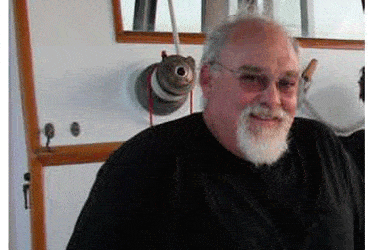
“For me, the highest level of personal fulfillment and contentment has always come from the enjoyment of providing service to others — both directly and indirectly,” muses Michael McNemeny. “We have spent the last 25 years caring for and servicing our wooden motorsailer Burma so that my family and friends can have an experience on the water unlike any other.”
McNemeny and his wife, Debbie, owned and ran a very successful Silicon Valley contracting business specializing in data centers for 22 years. They also owned and ran a Davis-designed, Nevins-built 1950 motorsailer for 25 years.
“We had always tried to balance the needs of the business, family, and Burma. In the beginning, the business dominated our lives and then the needs of the family would take precedence, but eventually when our children left home for their new horizons, more time for Burma became available.” A friend asked McNemeny to charter Burma to a member of the New York Yacht Club for its annual summer cruise and that was just the beginning of a new chapter in his life.
“There is no question that chartering was hard work, but the rewards were incredible in so many ways. I already had my 100-ton Coast Guard license, but I had no experience in the service of chartering, and what were the expectations of a member and official of the NYYC? Since that first, nine-day charter with someone who has become a very dear friend, we have chartered each summer, and truly love everything about it. Chartering for us has greatly increased the joy and pleasure of owning Burma. For the past several years now she has paid her way as a sustainable business, covering her maintenance expenses and then some.”
McNemeny keeps Burma in impeccable, Bristol condition and has spent hundreds of hours researching her history. He’s also a knowledgeable and relaxed skipper of Maine coastal waters. He continues to work with the NYYC and served for 13 years on Mystic Seaport Museum’s Board of Directors before stepping over to their National Council of Advisors.
Of his dramatic change of life since “retiring,” McNemeny remarks, “You know what they say; if you love what you do you’ll never work a day in your life.” Atlantic Pacific Charters, (650) 388-0537; www.atlanticpacificcharters.com
Martin Secot, La Sirena:
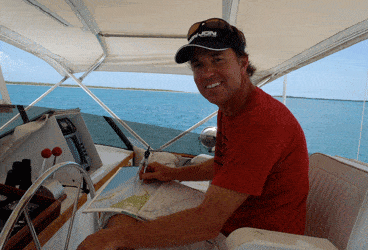
Martin was a high school history teacher until the age of 34, when he retired to St. Thomas in the U.S. Virgin Islands to run his own bar. He also helped open Yacht Haven Grande and its restaurants, including Wikked, where he was the first bartender. Naturally, he saw a lot of superyachts put in, including Rising Sun, and became friendly with visiting crew and owners. When Martin’s buddies returned to Yacht Haven Grande the following season, they persuaded him to get his STCW-95 (Standards of Training, Certification and Watchkeeping) certification.
“I did it and really wasn’t even looking for a boat but some owners of a yacht that were regulars of mine loved my Bloody Marys and hired me out of the bar,” said Martin. “I got into the game a little late but dedication and knowing a lot of people has helped me climb up pretty fast.” Three years after he started, Martin is almost done with his OOW (Officer of the Watch) certification and is the captain of a 90-foot Broward yacht.
Susan Scheer, Phantom:
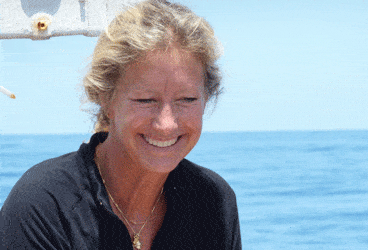
If you’re a frequent cruiser of Central American and Caribbean waters, you might have run across Susan Scheer aboard her 93-foot steel expedition boat Phantom. A documentary filmmaker who became an independent producer for the Discovery Channel, Arts and Entertainment and the Disney Channel, Scheer began her own stock photo business after 15 years, when her son Matthias was born
“Great American Stock allowed me to manage my own schedule. I sold the library to the Military Channel when my son was about seven and took off traveling across the states in an RV. That was divorce number 1 … 47 states later I started up Great American Stock again and remarried my former husband, Peter …” Susan’s husband was a surgeon and together they built a new surgery center in the desert. A few years later, Susan and Peter, who were already regular sailors, decided to sell everything and go cruising.
“I went to get my captain’s license at Chapman School of Seamanship in Florida. Meanwhile, Peter bought a big, old 90-foot crew boat named Phantom and started refitting it. It was almost divorce number 2, but I decided what the hell …”
Susan and Matthias, who was now 12, moved to Canada and spent a year overseeing Phantom’s transformation from crew boat to expedition vessel. When the work was done, they set off cruising, but somehow Peter never managed to join the party. Now divorced, Scheer kept the dream and the boat, and has cruised constantly for the past seven years, homeschooling Matthias along the way.
Phantom started chartering in 2005 with a treasure hunting adventure in the Perlas Islands of Panama that took it across the canal and into the Pacific. Susan and Matthias ventured to Cocos Island for a diving charter with a few friends and were hooked. “The diving was fantastic … hammerheads, bait balls, whale sharks, humpbacks … Phantom has been there four times in the past few years,“ notes Scheer. She has also journeyed to El Salvador, Honduras, Guatemala, Nicaragua, Costa Rica, Columbia and Ecuador.
“We studied languages and my son graduated from high school, got his dive master training and is on his way to Scripp’s Institution of Oceanography at University of California San Diego. We were hired for the Panamax Exercises in 2008, 2009 and 2010, military exercises where we acted out various roles as a drug smuggling vessel, a weapon carrying vessel and a threat to the canal. We were boarded by various foreign military navies and searched … All great experiences.”
Phantom is now available to charter for research, as a filming platform, a support vessel or as a mother ship in the Central American and Caribbean regions. www.phantomexplorer.com.


